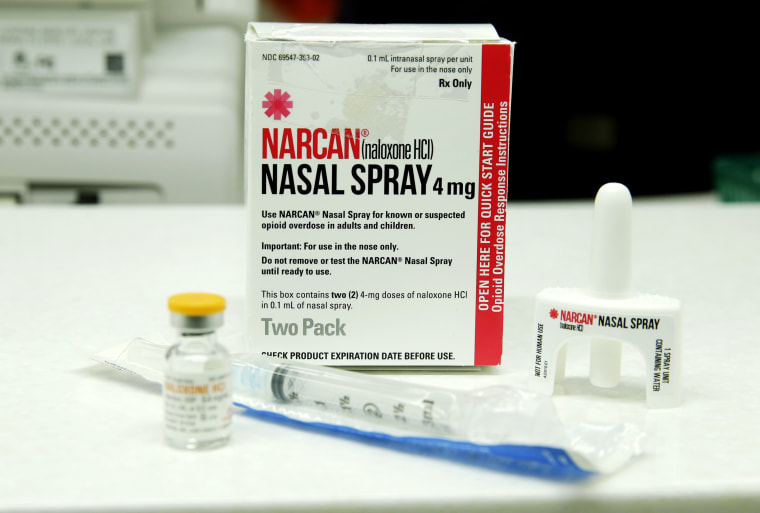The new GOP health care bill would demolish mental health care and abort efforts to fight the opioid crisis at the peak of the epidemic, mental health groups say.
The plan restructures Medicaid, the joint state-federal health plan for the disabled and low-income.

“Medicaid is the single largest payer of mental health and addiction treatment services in the country, paying 25 percent of all mental health and 20 percent of all addiction care,” the National Council for Behavioral Health says in a statement.
The group plans to launch a campaign on Wednesday against the proposed American Health Care Act, joining other groups such as the National Alliance on Mental Illness and the American Psychological Association.
“The American Health Care Act (AHCA) as written would devastate Americans’ mental health and addiction coverage and care,” Linda Rosenberg, president and CEO of the council, which represents mental health centers, addiction treatment organizations and hospitals, said in a statement.
Related: Opioid Addicts Worry About Losing Obamacare
The Congressional Budget Office “scored” the proposed law this week, saying it would save billions in federal health spending, mostly by cutting $880 billion from Medicaid. It would shift responsibility to states, and advocates say states have struggled in the past to fund medicaid and many have neglected addiction and mental health services.
“Put simply, if this bill passes, 14 million people who rely on Medicaid will not get the care they need, including millions for whom Medicaid provides treatment for substance use disorders or mental illnesses,” Rosenberg said.
“Many will instead end up homeless, in jail or dead.”
Improving mental health care in the U.S. has been a long-term, bipartisan fight.
“Many will instead end up homeless, in jail or dead.”
Fighting the opioid epidemic is another bipartisan issue.
Health and Human Services Secretary Tom Price and Seema Verma, newly confirmed as the administrator of the Center for Medicare and Medicaid Services, said said in a joint letter sent to governors Tuesday that they don’t plan to leave states out in the cold.
“We are committed to ensuring that states have the tools they need to combat the growing opioid epidemic that is devastating families and communities,” they wrote.
Deaths from opioid overdoses have hit an all-time record in the U.S.
The drugs killed more than 47,000 people in 2014 according to the Centers for Disease Control and Prevention.
Related: Ohio Coroner Gets Trailer to Use as Morgue
“Medicaid has emerged as states’ primary tool to tackle the opioid epidemic,” Rosenberg said.
“At a time when we are having an opioid epidemic we are virtually pulling the rug out from under families in this country,” she told NBC News.
The Affordable Care Act, aka Obamacare, sought to expand Medicaid by getting states to cover more people. More than half of states agreed to the expansion, which was paid for almost completely by the federal government.
It’s an open-ended commitment on the part of the federal government, and the GOP’s AHCA is designed to limit that by capping payments per person, and stopping people from re-enrolling if they leave the program for any reason.
“For people with mental illness, this is a high price to pay for forgetting to pay a premium while someone is in the hospital or experiencing severe symptoms,” NAMI said in a statement.
“Federal Medicaid funding would be frozen at current levels, adjusted for inflation. Funding for mental health and substance use services is already inadequate and could not be improved without cutting other needed health care.”
The CBO projected that would mean 14 million fewer Medicaid customers by 2026.
Related: Five Things to Know About the CBO AHCA Score
“Twenty-nine percent of the people who got Medicaid through the expansion have a mental illness or addiction,” Rosenberg said.
“They'll be in the streets. They will be homeless. They'll be picked up and put in our jails because they'll trespass or jump a turnstile if they're in a city,” she added.
“They'll try to live with any relative they can find. They'll be in shelters. They'll be in ER rooms in hospitals. And they will die.”
Related: 78 People Die a Day From Opioid Overdoses
Some of the states hardest hit by the opioid crisis have turned to what’s called medication assisted treatment (MAT) to help. It’s a type of therapy that uses drugs such as buprenorphine to help wean people off the addictive painkillers.
Medicaid pays anywhere between 35 percent and 50 percent of the costs of those programs, said Richard Frank, a health economics professor at Harvard Medical School, and Sherry Glied, Dean of the Wagner School of Public Service at NYU.
“It's another way to say we really don't believe in a safety net in our America."
Those states will have to come up with the money themselves or stop the programs, if the GOP bill goes through as written, critics say.
“It's another way to say we really don't believe in a safety net in our America,” Rosenberg said.
Price and Verma say they will find ways to help states.
“In recognition of the urgent need to improve access to comprehensive substance abuse treatment, we will continue to work with states to improve care for individuals struggling with addiction under their Medicaid state plans and through the Medicaid Innovation Accelerator Program to improve their substance abuse treatment delivery systems,” they wrote.
“We look forward to partnering with you in the years ahead to deliver on our shared goals of providing high quality, sustainable, health care to those that need it most.”
